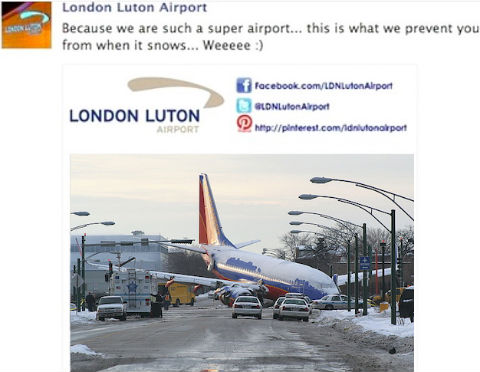
Luton Airport Facebook Status Update
We all make mistakes, say things we regret, make bad jokes, mistimed comments and are just misunderstood.
Even serious oversights can sometimes be forgiven, but in the digital world this all changes.
Every word is open to scrutiny, and the impact can be devastating not just for those passing the remarks, but also for those the remarks are made about. More pertinent though is the speed at which messages can now travel, so much so that any hope of retracting a mistimed remark is gone the moment you press the return key.
Email was our first iteration of the eternal message, the words that could never be erased, the trail of a conversation that could hold you to account. Now we are in the age of Social Media and not only has the speed with which we communicate accelerated, but the effective reach of any such message can be worldwide.
The exact reason Social Media is so popular with marketers is the same reason we all need to mindful of how we behave in this space.
Twitter Gets Political
A recent case has seen a flippant remark on Twitter by Sally Bercow, The House of Commons Speaker’s wife, result in a six month court case. When she Tweeted: “Why is Lord McAlpine trending? *innocent face*” following allegations made on the BBC’s Newsnight programme about an unnamed high-profile politician.
Although regret and apology followed it wasn’t enough to prevent the case going to court and her eventually agreeing to settle out of court with the Tory peer, Lord McAlpine.
What is important in this ruling is the way in which this message has been interpreted by the courts. Sally Bercow only alluded to the Newsnight allegations, did not repeat them or make any statement of fact.
Judge Tugendhat said there was no reason for Bercow to include the innocent face wording in her Tweet, and that her followers would have understood its meaning. “It is an allegation of guilt. I see no room on these facts for any less serious meaning.” said Michael Tugendhat the High Court Judge.
There is no doubt this case is an exception, but it does open the possibility of further similar cases being brought.
It is therefore important that companies, and individuals, are always mindful over what they say on Social Media. Ensure any representatives have received appropriate Social Media Training, and are made aware of the potential pitfalls.
Also, that they should make sure that all messaging is sensed checked before committing to the World Wide Web.
Facebook Faux Pas
It’s not only words that can get you into trouble, but the misuse of imagery can also lead to embarrassing situations.
Earlier this year Luton Airport updated their Facebook page with an image of a plane that had left the runway in snowy conditions, remarking that: “Because we are such a super airport….this is what we prevent you from when it snows……Weeeee :)”
Unfortunately, it turns out that someone was killed in the incident depicted in the update. Quick to react Luton Airport removed the the offending update, but not before local TV stations became aware and ran the story, which ended up going national.
In this case it turns out that an inexperienced member of staff had been given access to update the page. The knock on effects?
If you search Google for Luton Airports Facebook page the results returned are all press websites leading to this story.
Your company’s brand is too important to leave in the hands of trainees, and social media is no place for the uninitiated when it comes to your company’s reputation.
Think Before You Tweet
Even incidents outside of the workplace can have a negative impact on your business, as accountancy firm Larkin Gowen found out.
In an unfortunate incident new employee Emma Way came into contact with cyclist Toby Hockley when taking part in a 100 mile bike event in Norfolk. Although nobody was badly injured in the incident, one that would have in the past probably gone unreported. Emma Way passed comment on Twitter:
“Definitely knocked a cyclist off his bike earlier – I have right of way he doesn’t even pay road tax! #bloodycyclists”.
She was urged by local police, via Twitter, to report the incident and local and national press reported it widely over several days. In this case it lead to her suspension from her job at Larking Gowen and the company dealing with the backlash.
@emmaway20 we have had tweets ref an RTC with a bike. We suggest you report it at a police station ASAP if not done already & then dm us
— Norwich Police (@NorwichPoliceUK) May 19, 2013
In a statement Larking Gowen said: “Please be assured that this is not a view held by the firm and we most certainly do not condone this behaviour. We are taking the incidents very seriously, and a full and detailed investigation will be carried out and appropriate action taken. Please be assured that this is not a view held by the firm and we most certainly do not condone this behaviour. We are taking the incidents very seriously, and a full and detailed investigation will be carried out and appropriate action taken. We have already spoken to Norfolk Police.”
In all of these cases apologies were issued and updates retracted, yet the speed with which the updates spread online meant there was no going back.
With the right staff training, a thoroughly developed content strategy and the right tools in place a lot of this can be avoided. The biggest lesson is that it is up to companies to ensure their staff are aware of the impact that way they say online can have on the business.
Does your company have a Social Media Strategy or offer all it’s staff Social Media Training? If not, get in touch with SeanClark.com to see how we can help.





